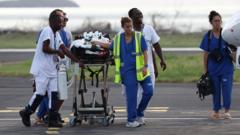Local community members describe a frantic rush to grocery stores, where clean drinking water is severely rationed. Ali Ahmidi Youssouf, a resident from Pamandzi, shared, “Everyone is rushing to the stores for water. There is a general shortage.” On Wednesday, officials reported that efforts were underway to partially restore the water supply, with hopes that by evening, half of the island's population would regain access.
The impact of Cyclone Chido, which brought winds exceeding 225 km/h (140 mph), is unprecedented; it is described as the worst storm to hit the region in 90 years. Accounts from locals highlight the cyclone's destructive force, with Nasrine, a teacher, stating, “It was like a steamroller that crushed everything,” while Diego Plato, a photographer, noted that roofs were ripped away like paper. With many roads blocked and buildings compromised, rescuers are diligently searching for survivors amid the rubble.
The French government has begun to deliver aid, including 120 tonnes of food, with President Emmanuel Macron planning to visit Mayotte soon. Meanwhile, efforts to assess the full extent of the damage continue, with initial estimates indicating that 1,373 individuals sustained injuries, exacerbating the dire situation.
The aftermath of Cyclone Chido not only challenges the recovery of Mayotte but also highlights the vulnerabilities faced by this impoverished French territory, which is believed to have a substantial undocumented migrant population. International support is mobilizing as the region confronts the daunting task of rebuilding amidst escalating humanitarian needs.
In Malawi, where Cyclone Chido passed next, seven deaths were reported as authorities grapple with damage impacting approximately 35,000 individuals across up to 20 districts. The growing intensity of seasonal storms is attributed to rising ocean temperatures, posing new challenges for governments already facing political unrest and environmental pressures.
With urgent aid still needed and the potential for increasing casualties, Mayotte's path to recovery remains fraught with obstacles as communities strive for stability in the cyclone's wake.
The impact of Cyclone Chido, which brought winds exceeding 225 km/h (140 mph), is unprecedented; it is described as the worst storm to hit the region in 90 years. Accounts from locals highlight the cyclone's destructive force, with Nasrine, a teacher, stating, “It was like a steamroller that crushed everything,” while Diego Plato, a photographer, noted that roofs were ripped away like paper. With many roads blocked and buildings compromised, rescuers are diligently searching for survivors amid the rubble.
The French government has begun to deliver aid, including 120 tonnes of food, with President Emmanuel Macron planning to visit Mayotte soon. Meanwhile, efforts to assess the full extent of the damage continue, with initial estimates indicating that 1,373 individuals sustained injuries, exacerbating the dire situation.
The aftermath of Cyclone Chido not only challenges the recovery of Mayotte but also highlights the vulnerabilities faced by this impoverished French territory, which is believed to have a substantial undocumented migrant population. International support is mobilizing as the region confronts the daunting task of rebuilding amidst escalating humanitarian needs.
In Malawi, where Cyclone Chido passed next, seven deaths were reported as authorities grapple with damage impacting approximately 35,000 individuals across up to 20 districts. The growing intensity of seasonal storms is attributed to rising ocean temperatures, posing new challenges for governments already facing political unrest and environmental pressures.
With urgent aid still needed and the potential for increasing casualties, Mayotte's path to recovery remains fraught with obstacles as communities strive for stability in the cyclone's wake.





















